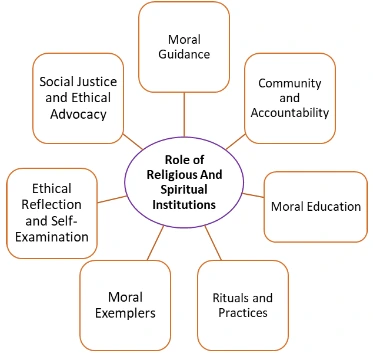Answer:
|
How to approach this question?
- Introduction
- Briefly write about the importance of religious and spiritual institutions.
- Body
- Write about the role of religious and spiritual institutions in fostering ethical values and promoting moral development.
- Conclusion
- Conclude on the positive note.
|
Introduction
Religious and spiritual institutions serve as influential pillars in society, providing guidance and support for individuals seeking ethical values and moral development. With a rich tapestry of teachings, rituals, and practices, these institutions offer frameworks for understanding right and wrong, promoting virtues such as compassion, justice, and integrity.
Body
Religious And Spiritual Institutions: Ethical Values and Moral Development:
- Moral Guidance: Religious institutions exemplify moral guidance through community service and acts of charity.
- For instance, a church organizing regular food drives showcases compassion and a commitment to helping local families in need.
- Community and Accountability: Religious and spiritual institutions foster community and accountability, where individuals support and hold each other to ethical conduct.
- This may be seen through mosque study circles and retreats that encourage moral discussions and provide a sense of shared responsibility.
- Moral Education: Religious and spiritual institutions often provide moral education through religious texts, sermons, and teachings.
- For instance, a Sunday school class might delve into stories and lessons from sacred texts to help children understand the importance of honesty, integrity, and fairness in their lives.
- Rituals and Practices: Rituals and practices within religious and spiritual traditions reinforce ethical values and encourage moral behavior.
- For example, In certain traditions, individuals engage in symbolic rituals to express forgiveness and gratitude, reinforcing the significance of these virtues in their daily lives.
- Moral Exemplars: Religious and spiritual traditions highlight moral exemplars,
 like Mahatma Gandhi, inspiring individuals to embody their virtues. Gandhi’s commitment to nonviolence and equality serves as a real-world example that motivates people to embrace similar values.
like Mahatma Gandhi, inspiring individuals to embody their virtues. Gandhi’s commitment to nonviolence and equality serves as a real-world example that motivates people to embrace similar values.
- Ethical Reflection and Self- Examination: Religious and spiritual institutions promote self-reflection and growth through prayer, meditation, and spiritual practices, allowing individuals to assess their ethical choices.
- For example, a person may engage in meditation to reflect on their behaviour and contemplate how they can align their actions more closely with their values.
- Social Justice and Ethical Advocacy: Religious and spiritual institutions advocate for social justice and ethical causes, addressing poverty, discrimination, and environmental concerns. They inspire responsibility towards the well-being of others,
-
- such as a synagogue organizing campaigns against homelessness and promoting equal rights.
Conclusion:
Religious and spiritual institutions play a crucial role in fostering ethical values and moral development, but they also face the challenge of addressing communal tensions and promoting interfaith harmony. To overcome this, they can encourage interfaith dialogue and collaboration to foster understanding and respect among different religious communities.
To get PDF version, Please click on "Print PDF" button.
 like Mahatma Gandhi, inspiring individuals to embody their virtues. Gandhi’s commitment to nonviolence and equality serves as a real-world example that motivates people to embrace similar values.
like Mahatma Gandhi, inspiring individuals to embody their virtues. Gandhi’s commitment to nonviolence and equality serves as a real-world example that motivates people to embrace similar values.
https://uploads.disquscdn.com/images/1eb6671f7be3617dc257d5b8759582776f76c73a9cc3d8a685cad45ea83ec89b.jpg https://uploads.disquscdn.com/images/60a4730c137532c10367d7fe23b714e38959b1dba615b518dacd68e35f5370f2.jpg
https://uploads.disquscdn.com/images/af6db70c67d44bbe2712c9bf0d8b7bfff46fae33acfca77231c73acd6b9612b9.jpg https://uploads.disquscdn.com/images/c88cbf7a723366e6f27e90c5829a68d470dab648c4dedaae7005be9ed3d1a296.jpg
https://uploads.disquscdn.com/images/42524c26140f5286371a123435e034c2bc9bb5e1bf9661b37c769c5d4f47c09d.jpg https://uploads.disquscdn.com/images/039c58470f6f6a734d3bce25552c96c3d3f971b4e3894621d0683c7c0b4dae4d.jpg
https://uploads.disquscdn.com/images/44b0fdfba6131dc4bbe2aa3b9b4eea5d0e141a9ff950de07f47fada67b01db24.jpg https://uploads.disquscdn.com/images/ebf7d447a04e590f5dffae48c1e3bd3bdb21fda7b13032765965deabac689a48.jpg